- Home
- Sandra Chastain
Raven and the Cowboy: A Loveswept Historical Romance Page 29
Raven and the Cowboy: A Loveswept Historical Romance Read online
Page 29
But when the police came, they were not pleased.
“Now calm down, calm down,” ordered the officer in charge. His name was Detective Valentine, and Valentine was an unlikely name for him. He was a tall, disheveled, heavy man who needed a shave and gave off an aura of sweat and cynicism. He had gathered them in the school cafeteria.
But few of the children calmed down, and Shelley Simmons still could not stop crying. When an officer tried to comfort her, she slapped at him and cried harder because he wore a gun. The medics should have given her a sedative, but in the confusion, nobody had thought of it.
The woman on the sidewalk had been critically wounded, and the bone in William’s upper arm had been nicked. Both the woman and the child had been strapped onto gurneys and loaded into ambulances that sped screaming away. The school had been bedlam.
Trace’s cheek had been cleaned and patched, and now Laura sat beside him, trying to keep him from scratching at his bandage. He muttered to himself, his dark brows drawn together. Rickie sat on Laura’s other side, humming.
“Listen!” ordered Valentine, eyeing his weepy audience with disgust. “Did anybody see the whole thing? Just answer me that.”
Nobody replied. Janine set up a fresh wail, and Herschel leaned his elbows on the table and put his face in his hands.
“I said,” Valentine repeated, his lip curling, “did anybody see the whole thing?”
Laura waited, her heart hammering, to see if any of the other adults had witnessed the shooting, but nobody spoke.
“We did,” she said so quietly nobody seemed to hear her. “We did,” she said again. She had her arm around Trace, the better to restrain him from scratching at his cheek.
Trace didn’t want to be touched and tried to squirm free. His brother stared impassively at the detective and kept humming.
Valentine had dark, bulging eyes that reminded Laura of a bulldog’s. He trained them on her with no friendliness. “All three of you?”
“Yes.” She nodded. “They got the license number. They saw the gunman clearly.”
The room suddenly became quieter. Valentine stared at Trace and Rickie. They ignored him. Trace muttered. Rickie hummed.
“They seem calm enough,” Valentine said, almost grudgingly. “Will they talk?”
“Yes. I—think so.”
He nodded. He looked askance at Janine blubbering in Fanny’s embrace, at Jilly huddled in the farthest corner, at Shelley Simmons still openly weeping.
“Where can we talk?” Valentine’s voice wasn’t kind.
“In my office. Down the hall,” Laura said. “Room One-E.”
“Room One-E,” said Rickie.
“Room One-E,” Trace repeated, trying to shake off Laura’s hand.
One of the children, Fergus, began to make a strange, mournful yipping noise. “I want my room!” Fergus cried. “I want my bed! My room! My bed!” He yelped again, more stridently and unhappily than before.
Valentine sighed. “Let’s go to One-E,” he said. Weariness mingled with contempt in his voice. “Eagan, take over here. Oliphant, come with me.”
He and Oliphant, a slim young black officer in uniform, accompanied Laura and the twins to her office. Trace muttered, frustrated that he couldn’t scratch at his bandage. Rickie kept humming.
Laura’s office was small but cheerfully decorated. Looking down from the walls were framed posters of Mr. Spock of Star Trek, Ariel the Little Mermaid, and Simba the Lion King. In the corner stood a small work table with a child’s colorful, simple puzzle on it. Four shelves were crammed with books, both adults’ and children’s.
Tacked on one bulletin board were children’s drawings and snapshots of the students and staff. On another bulletin board, student charts displayed gold stars. Some charts had many gold stars. Some had few.
Valentine lumbered to Laura’s desk and, without asking, sat down heavily in her chair. She didn’t like that. The uniformed officer, Oliphant, pushed aside a pile of her papers and sat on the corner of her desk. She didn’t like that, either.
Both men stared at her. Valentine raised his hand and made a beckoning motion, as if coaxing her to respond quickly and without nonsense. “You?” He nodded at Laura. “Who are you? What’s your job here?”
“I’m Laura Stoner. I’m a teacher.”
“Age? Address?”
She told him she was twenty-eight and gave him her address, which was in a neighborhood far more modest than the school’s. With an air of industry, Oliphant wrote the information on a notepad.
“How long you worked here?” Valentine asked. He picked up her appointment book and flipped through it idly. His presumption irritated her.
“We can do a puzzle,” Trace said suddenly. He spoke so loudly that it startled Oliphant, who darted him a questioning look.
“We can do a puzzle,” Rickie agreed. He had begun to fidget. She held both boys by the hand, and both were squirmy.
“Stand there,” she told them firmly. “Be still. You can do a puzzle in ten minutes.”
Both immediately looked at their watches. Rickie nodded, a bit sullenly. Trace continued to try to pick at his bandage.
“Don’t touch your bandage, Trace,” she said, just as firmly. “Look,” she said to Valentine, “can you hurry? They’re restless. And upset.”
“Let ’em do the puzzle,” Valentine said without smiling. “And you—you can sit.” He nodded at the chair opposite the desk as if it were his office, and he was giving her permission to use her own furniture. He apparently found something of interest in her appointment book. He stared at the page, nodding idly.
Laura, shaken as she was, felt a stab of anger. She had intended to help the police, not be patronized by them. She held herself straighter.
“They’ll do their puzzle when I tell them they can,” she said evenly. “I don’t want to sit—you’re in my chair. I’ll stand. And please put down my appointment book. You’re not here to investigate me.”
Valentine, unsmiling, only raised a brow. Oliphant slipped her a noncommittal glance. “He asked you how long you’ve worked here, Miss Stoner,” Oliphant said in a velvety voice. “You didn’t answer.”
“Three years.”
“Before that?” Valentine said. He glanced at a few more pages in the appointment book, then made a show of setting it back on her desk, but not in its original place.
“Before that I was getting my master’s at Columbia,” she said. “And before that I taught public school. And before that I was in college at Penn State. And before that high school in New Castle, Pennsylvania. And before that, junior high in New Castle. And before that grade school in New—”
“All right,” Valentine said, cutting her off. “Now, I got to question you. One at a time. The kids first. I don’t want any allegation they were coached. So leave and wait outside the door—”
“That isn’t possible,” Laura said. “They won’t talk without me here.”
Valentine stared morosely at the twins. He tented his fingers on the desktop. He attempted a fatherly smile, but it seemed merely sarcastic. “What are your names, boys?”
Neither looked at him, and neither answered.
Valentine leaned toward them, still trying to smile. “What are your names, boys?” he repeated.
Trace stared at the floor. Rickie squinted at the ceiling.
“They’re upset, and they won’t talk to strangers,” Laura said. She was right, and she knew it. “Ask them whatever you have to. I won’t coach them. And I haven’t.”
“This isn’t regular procedure—Miss Stoner.”
“This isn’t a regular day for us—Detective Valentine.”
He sat back in her chair. He still wore his hat, brim pulled down, and his overcoat, unbuttoned. He took off the hat and set it on her stack of papers. His hair was thinning and slicked tight to his scalp. It gleamed, as if oiled or dirty. “What are their names?” he asked tonelessly.
“Tell the man your name, Trace.”
Trace glanced at his watch, stared at the floor, and said, “My name is Trace Francis Fletcher. I’m eight years old. I go to Stephenson School. I live there.” He gave his address and telephone number.
“Very good, Trace,” Laura said, smiling. “Now you, Rickie.”
Rickie continued to study the ceiling with narrowed eyes. “My name is Richard Mark Fletcher. Call me Rickie. I’m eight years old. I go to Stephenson School. I live there.”
He gave his address and telephone number in the same singsong voice that Trace had used.
Oliphant stole another glimpse at the boys. His expression had grown guarded, measuring.
Valentine, who clearly didn’t understand children, gave them another small, false smile. He put his elbows on the table and folded his hands together. “Now, boys, suppose you tell me what you saw this afternoon on the playground. Can you tell me what you saw? If you do a good job, I’ll have Officer Oliphant here buy you some ice cream.”
“Ice cream?” Trace said, his voice shrill. “Ice cream!”
“No, Trace,” Laura said calmly, “you can’t have ice cream. You can have juice. Tell what you saw. Tell what happened to the man with the cane.”
Trace frowned harder. Laura repeated her instructions. Trace took a deep breath. He cast an unfriendly glance at Oliphant but still did not look at Valentine. “The man turned the corner. The man took one hundred and twenty-nine steps. The man fell down.”
Valentine pursed his lips and stared at Trace with dissatisfaction. “What is this—a hundred twenty-nine steps?”
“They’re interested in numbers,” Laura said and pressed on, choosing her words carefully. “Trace, tell what you heard when the man fell.”
“Shots,” Trace answered without hesitation. “Thirty shots.”
“Tell what the shots did,” Laura said.
“Now, wait,” Valentine said, irritably, “you’re prompting him—”
“Nineteen shots hit the man.”
Oliphant looked up again. “That’s flukey, man. He got hit about twenty times, all right. How he know that?”
“Trace,” Laura said quietly. “Tell me where the shots came from.”
“The car,” he answered. “The car was big. The car was blue. The car said ‘Cadillac.’ The car said ‘de Ville.’ ”
“Now—wait a minute,” Valentine interrupted. “What’d he say? We got all kinds of conflicting witnesses on that car. Is he sure? Is he one of those kids that knows cars—?”
Oliphant’s face had gone taut. “Jesus,” he said under his breath.
“Trace,” Laura said. “You said you saw a license number. Tell me the number.”
“Now, wait a minute—a license number?” Valentine asked, skepticism in his bulldog eyes. “He’s just a kid—”
Trace cocked his head as if Valentine’s voice annoyed him. “The number was MPZ one oh four eight one nine.”
Rickie nodded absently. “The number was MPZ one oh four eight one nine.”
Oliphant scribbled furiously. “Jesus Christ,” he said. “Sweet Jesus.”
Valentine merely stared at Trace, his brow furrowed, his mouth set cynically.
“Thank you, Trace,” Laura said. “That was very good.” She turned to Rickie. “Rickie. What happened today to the man with the cane?”
Rickie stopped staring at the ceiling and began to stroke his own cheek, one finger at a time, never using his thumb. He answered her questions as Trace had, almost verbatim.
“Tell me the license number,” she said at last.
“MPZ one oh four eight one nine,” said Rickie.
“MPZ one oh four eight one nine,” Trace echoed.
“Go radio headquarters,” Valentine ordered Oliphant. “Tell them to put an APB on the number.”
Oliphant got up swiftly from the desk and gave the twins a wary look. “Like, that’s spooky, man.”
“Like, that’s spooky, man,” Rickie repeated as Oliphant left the room. His childish voice mimicked the officer’s inflection.
“Like, that’s spooky, man,” Trace said.
“What is this?” Valentine demanded. “This is weird. I never saw nothing like this. Can I believe these kids?”
“Can I believe these kids?” asked Trace.
“Absolutely,” Laura said with confidence.
“Absolutely,” repeated Rickie in the same tone.
“Why are they saying everything we say?” Valentine asked, his nostrils flaring.
“Why are they saying everything we say?” Trace said.
“Why are they saying everything we say?” Rickie said.
“Why are they saying everything we say?” Trace said again.
“Don’t echo, Trace,” Laura said, shaking her head. “Don’t echo, Rickie.”
“We can do a puzzle,” Trace said, looking at his watch. Rickie, too, looked at his watch. He pressed his lips together and nodded.
“Yes,” she agreed. “You can do a puzzle. Sit at the table.”
They marched to the table, pulled out the two chairs, and sat. Rickie pushed the child’s puzzle away.
Laura went to a shelf and took down a jigsaw puzzle. “It’s a new one,” she told them, taking the cellophane from the box. “It doesn’t make a picture.”
They waited stolidly. She was proud of finding the puzzle. It was labeled “Highly Difficult” and contained a thousand pieces. On both sides, it was black.
Carefully she poured the pieces of the puzzle to the middle of the table. The boys began to spread them out, sorting. Rickie immediately found four pieces that fit and locked them together.
Laura moved to her desk and set down the puzzle box so that Valentine could see it.
Trace, who was obviously more tired than Rickie, began to mutter loudly. “Blue rhubarb,” he said emphatically. “Blue rhubarb, blue rhubarb.”
“Cows can fly,” Rickie said, apropos of nothing. “In outer space. Cows fly in outer space.”
Valentine looked up from the puzzle box and at the twins. He regarded them with something bordering on horror.
“Why do they talk like that?” he demanded. “What’s this ‘blue rhubarb’? What’s he mean, ‘Cows fly’? What’s with the repeating?”
Laura pressed her lips together and searched for words.
“Blue rhubarb, blue rhubarb, blue rhubarb,” chanted Trace.
“Cows can fly,” Rickie said, sounding bored. “MPZ one oh four eight one nine. MPZ one oh four eight one nine.”
Valentine swore, his expression more horrified than before. It was as if he was staring at two serpents, not two little boys.
He swung his head so that he faced Laura. “These kids aren’t right in the head, are they?” he challenged, contempt in his voice.
“These children are special,” she said. “And I have to get them their juice. I promised them.”
She went to the small refrigerator on the counter and took out two containers of apple juice. She opened the snap tops and carried the juice to the table.
Mechanically Rickie muttered, “Thank you.”
“Thank you,” Trace said, quickly fitting the puzzle pieces together. “Blue rhubarb, blue rhubarb, blue rhubarb.”
Valentine stared at them again as if repelled. “These kids are retards—retards.”
Laura turned to face him, putting her hand on her hip. She knew his contempt could not hurt the boys. It would not even register on them. “The correct word is autistic, Mr. Valentine. But I’d prefer you use the word ‘special,’ as the staff does.”
He swore and turned his gaze back to her, his eyes glittering angrily. “That’s what the ‘special’ in this school means? It’s a school for morons and nut bars?”
Laura gave him a withering look. “This school serves children with special needs. What kind of school did you think it was?”
“I don’t know,” Valentine almost snarled. “Some of ’em was crippled or something. I thought it was a cripple school. Only these two look so normal, I didn’t know—how’m I supp
osed to know—?”
Laura crossed her arms and looked away angrily. She didn’t tell him they didn’t use the word “crippled,” either. Some of the children had cerebral palsy in addition to mental retardation. And Fergus, who had been brain-injured in a car accident, was in a wheelchair.
“For a minute,” Valentine said angrily, “I thought I got dream witnesses here. Kids who know cars. Very observant kids. With good memories. I thought maybe this is a school for the special smart. Now you tell me they’re loons.”
Laura swung back to face him. “Don’t call them names,” she ordered. “They do know cars. They are observant. They do have good memories.”
“Yeah?” Valentine challenged, his mouth twisting. “How do I know they aren’t just repeating what they’re told? They’re like two parrots, goddamnit.”
“No,” she argued. “They’re children with a condition. Sometimes they repeat what they hear. It’s called echolalia.”
“Yeah?” Valentine said again. “So how do I know it ain’t you they’re echoing, or whatever the hell you said? I mean, who’s gonna believe a kid who says ‘blue rhubarb’ all the time, or that cows fly? Christ, lady, you realize you just had me send in a report based on the testimony of two—two retards?”
Laura clenched her fists atop the desk and leaned toward Valentine. “I said, don’t use language like that. What they said is right. I’d swear to it. They’re never wrong about numbers. They may be handicapped in some ways, but they’re gifted in others. In observation. In—in dexterity. In spacial perceptions. But especially in numbers. About numbers they’re never wrong—never.”
“Oh, shit,” Valentine said bitterly. “Why’d I get outta bed this morning?”
“Believe me,” she said earnestly. “It’s true. They’re never wrong about numbers.”
Valentine looked away from her. He put one hand to his temple. “Shit,” he said again. “Shit and blue rhubarb.”
“I can’t tell you how many steps that man took,” Laura pleaded. “But they can. It’s what they do. I didn’t notice the sort of car. I didn’t count the shots. I didn’t see a license number. But they could, and they did.”

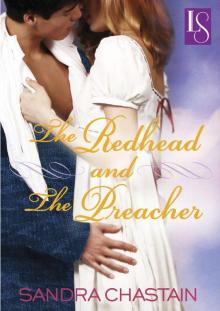 The Redhead and the Preacher: A Loveswept Historical Romance
The Redhead and the Preacher: A Loveswept Historical Romance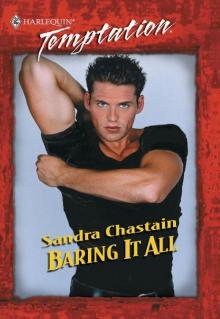 Baring It All (Mills & Boon Temptation)
Baring It All (Mills & Boon Temptation)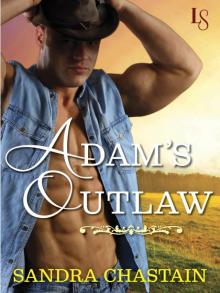 Adam’s Outlaw
Adam’s Outlaw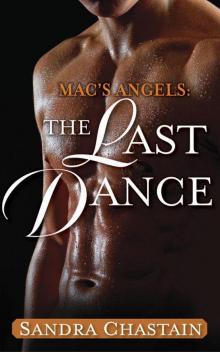 Mac's Angels: The Last Dance: A Loveswept Classic Romance
Mac's Angels: The Last Dance: A Loveswept Classic Romance Imaginary Lover
Imaginary Lover The Judge and the Gypsy
The Judge and the Gypsy Silver Bracelets: A Loveswept Contemporary Classic Romance
Silver Bracelets: A Loveswept Contemporary Classic Romance Penthouse Suite
Penthouse Suite Lean Mean Loving Machine: A Loveswept Classic Romance
Lean Mean Loving Machine: A Loveswept Classic Romance Joker's Wild
Joker's Wild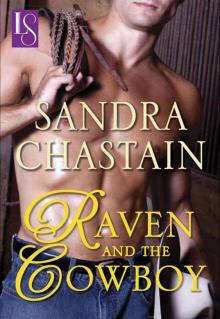 Raven and the Cowboy: A Loveswept Historical Romance
Raven and the Cowboy: A Loveswept Historical Romance Night Dreams
Night Dreams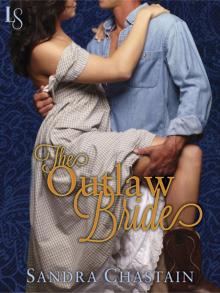 The Outlaw Bride
The Outlaw Bride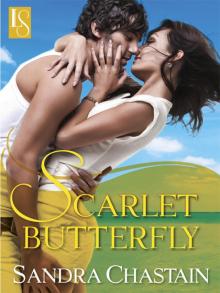 Scarlet Butterfly
Scarlet Butterfly Mac's Angels
Mac's Angels Run Wild With Me
Run Wild With Me Lean Mean Loving Machine
Lean Mean Loving Machine